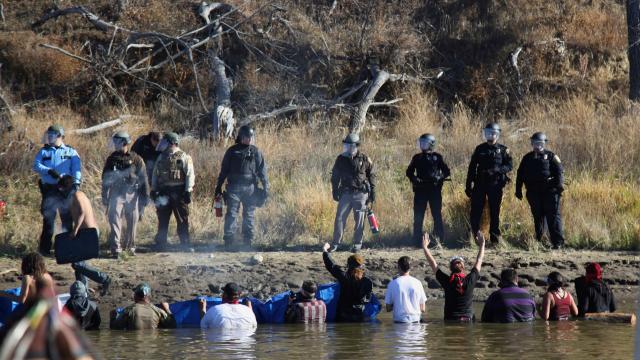Nearly three years after two women began allegedly plotting to disrupt the Dakota Access Pipeline, the U.S. Department of Justice (DOJ) is charging them with several federal crimes that could land them behind bars for 110 years.
The two women were part of the 2016 Dakota Access Pipeline protests, and are the latest targets in a national effort to punish more environmental activists — especially indigenous peoples — for protesting and taking direct action against fossil fuel projects that they believe sacrifice the future of their water, lands and planet.
Jessica Reznicek and Ruby Montoya weren’t arrested then, however. They stood in solidarity with the Standing Rock Sioux Tribe, which was spearheading the resistance, by damaging the crude oil pipeline along its Iowa route. The DOJ announced their charges — which include conspiracy to damage an energy facility, use of fire in the commission of a felony and malicious use of fire — Thursday. The women claimed these crimes years ago, though, so it’s unclear why the DOJ is charging them now.
In July 2017, Reznicek and Montoya stood before the Iowa Utilities Board office and described burning parts of the pipeline and pieces of equipment along the route of the Dakota Access Pipeline. This was all illegal as hell, but the activists wanted to see the project delayed by any means necessary.
“With DAPL, we have seen incredible issues regarding the rule of law, indigenous sovereignty, land seizures, state-sanctioned brutality, as well as corporate protections and pardons for their wrongdoings,” Reznicek said during that summer day in Iowa some two years ago, per the Des Moines Register.
Now, Reznicek and Montoya face up to 110 years in prison for these alleged crimes. If convicted, they would be the latest to go to jail for protesting the pipeline. All of the other individuals have been incarcerated are indigenous, Carl Williams, the executive director of the Water Protector Legal Collective, which is representing them in court, told Gizmodo.
There were 761 arrests made during the protests, but only five individuals have served time. Some are still in prison, but others are out on parole and, as Williams put it, “still under the control of the federal government.”
Among those still in jail is Red Fawn Fallis who is serving nearly a five-year sentence for illegally possessing a gun and shooting it during a protest. Her case, in particular, received some media attention after The Intercept reported that the gun in question belonged to her romantic partner at the time, Heath Harmon, who was also working undercover for the FBI as an informant.
However, the rest of the individuals who have been incarcerated due to the indigenous uprising at Standing Rock have received little attention. They include Michael “Little Feather” Giron who was released last week after serving more than two years in prison for blocking a highway law enforcement was trying to access at the height of the protests. Michael “Rattler” Markus is still serving a three-year sentence.
“I tell people there are still people in prison, and they’re shocked,” said Williams. “All of it should receive more attention than it does.”
The world’s reliance on fossil fuels needs to end real soon if we’re going to avoid a worst-case scenario of what climate change may look like and leave a world hospitable enough for future generations. That’s made a growing number of people turn to direct action.
In New Hampshire earlier this month, activists tried to steal coal from a power plant to highlight the need to stop burning coal in light of the climate crisis. Nearly 70 people were arrested.
U.S. State leaders, however, aren’t exactly down with people breaking the law in their effort to draw attention to climate change or other issues for that matter. Since the Standing Rock protests, 36 states have considered laws to punish peaceful assembly. Sixteen so-called “protest laws” have been enacted across the U.S. since November 2016, according to the International Centre for Not-for-Profit Law.
In Texas, which passed one of these laws in June, more than two dozen protestors who shut down an oil port in September face up to 10 years in prison for their move.
“There is an extinction-level event happening right now in the world,” Williams said. “Something must be done, and something must be done not now but quite a while ago. Something must’ve been done quite a while ago to save millions of species of animals, to save human existence as we know it on this planet.”
When it came to the Dakota Access Pipeline, activists weren’t only taking action for the planet or climate change. They were calling for indigenous sovereignty in America. Unfortunately, that cost some individuals their freedom — and Reznicek and Montoya may soon face the same fate.
